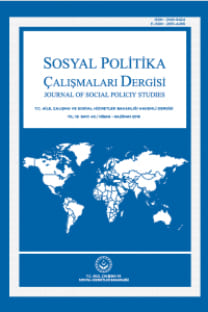Nancy Chodorow’un Düşüncesinde Toplumsal Cinsiyet Organizasyonunun Merkezi Unsuru Olarak Annelik
Annelik rolü, toplumsal cinsiyet kimliği, cinsiyete dayalı iş bölümü, psikanalizm, feminizm
Theoretical Explanations of Nancy Chodorow on Maternity Role
___
- BASOW, Susan S. Gender: Stereotypes and Roles, Ca- lifornia, Paciic Grove, Brooks/Cole Publishing Company, 1992.
- BURR, Vivien. Gender and Social Psychology, London, Routledge, 1998.
- CHODOROW, Nancy. “Being and Doing: A Cross-Cultu- ral Examination of the Socialization of Males and Females.” V. GORNİCK ve B. K. MORAN (Ed.), Women in Sexist Society, London: Basic Books, Inc., Publishers, 1971:173-197.
- - “Family Structure and Feminine Personality.” M.Z. RO- SALDO ve L. LAMPHERE (Ed.), Woman, Cultu- re, and Society: A Theoretical Overview”, Woman, Culture, and Society, Standfort: Standfort Univer- sity Press, 1974: 43-66.
- - The Reproduction of Mothering, Psychoanalysis and the Sociology of Gender, London, University of California Press, Ltd. 1978.
- - “Feminism and Psychoanalytic Theory”, S. KEMP ve J. SQUİRES (Ed.), Feminisms, Oxford: Oxford University Press, 1997:182-188.
- - “Gender, Relations and Difference in Psychoanalytic Perspective.” The Polity Reader in Gender Studi- es, Oxford: Polity Press, 1998: 41-49.
- COLTRANE, Scott. Gender and Families, London, Sage Publications Ltd. 1998.
- CONNELL, R. W. Toplumsal Cinsiyet ve ktidar, Toplum, Kii ve Cinsel Politika, (Çev. Cem Soydemir), İs- tanbul: Ayrıntı Yayınları, 1998.
- DONOVAN, Josephine. Feminist Teori, (Çev. Aksu BORA ve DİĞERLERİ), İstanbul: İletişim Yayın- ları, 1997.
- GUİRE, Jacqueline Mc., “Sons and Daughters.” A.PHOENİX, A. WOOLLETT ve E. LLOYD, (Ed.) Motherhood: Meaning, Pratices and Ideologies, London, Sage Publications Ltd., 1991: 143-161.
- NİCOLSON, Paula. “Motherhood and Women’s Lives”, D. RİCHARDSON ve V. ROBİNSON (Ed.), Intro- ducting Women’s Studies, Feminist Theory and Practice, London, The Macmillan Press Ltd., 1993: 201-223.
- ORTNER, Sherry B. “Is Female to Male as Nature Is to Culture?” M.Z. ROSALDO ve L. LAMPHERE (Ed.), Woman, Culture, and Society: A Theoretical Overview”, Woman, Culture, and Society, Stand- fort: Standfort University Press, 1974: 67-87.
- PARSONS, T. ve R. F. BALES. Familiy, Socialization and Interaction Process, New York, The Free Press, 1955.
- ROSALDO, M. Zimbalist. “Woman, Culture, and Soci- ety: A Theoretical Overview.” M.Z. ROSALDO ve L. LAMPHERE (Ed.), Woman, Culture, and Soci- ety: A Theoretical Overview”, Woman, Culture, and Society, Standfort: Standfort University Press, 1974: 17-42.
- STEEVES, H.Leslie. “Feminist Teoriler ve Medya Ça- lışmaları.” Medya, ktidar, deoloji, (Der. Mehmet Küçük), Ankara: Bilim ve Sanat Yayınları, 1999: 127-197.
- UNGER, R. ve M. CRAWFORD. Women and Gender: A Feminist Psychology, Philadelphia: Temple Uni- versity Press, 1992.
- ISSN: 2148-9424
- Yayın Aralığı: Yılda 4 Sayı
- Başlangıç: 2012
- Yayıncı: Aile,Çalışma ve Sosyal Hizmetler Bakanlığı
Nancy Chodorow’un Düşüncesinde Toplumsal Cinsiyet Organizasyonunun Merkezi Unsuru Olarak Annelik
Türkiye'de Erken Yaşta Yapılan Evlilikler ve Risk Algısı: Bismil Örneği
Yrd. Doç. Mustafa ORÇAN, Doç. Dr. Muhsin KAR
Üniversite Son Sınıf Öğrencilerinin Evliliğe Bakış Açısı
Vardiyalı Çalışan Kadın İşçilerin Beslenme Alışkanlıkları Üzerine Bir Araştırma
Aile Kurumuna Yönelik Güncel Riskler
Kadınların ve Erkeklerin Menopoza İlişkin Görüşleri
Hemşire Sedriye ÖZTÜRK, Prof. Dr. Ayla Bayik TEMEL, Öğr. Gör. Dr. Şafak ERGÜL
Okul Öncesi Dönemde Sosyal-Duygusal Gelişime Anne-Baba Davranışlarının Etkisi
Yrd. Doç. Dr. Adalet KANDIR, Uzm. Yasemin ALPAN
Öğrencilerin Fene Yönelik Tutumlarına Ailelerinin Etkisi
Arş. Gör. Dr. Hilal AKTAMIŞ, Arş. Gör. Gül ÜNAL, Prof. Dr. Ömer ERGİN
